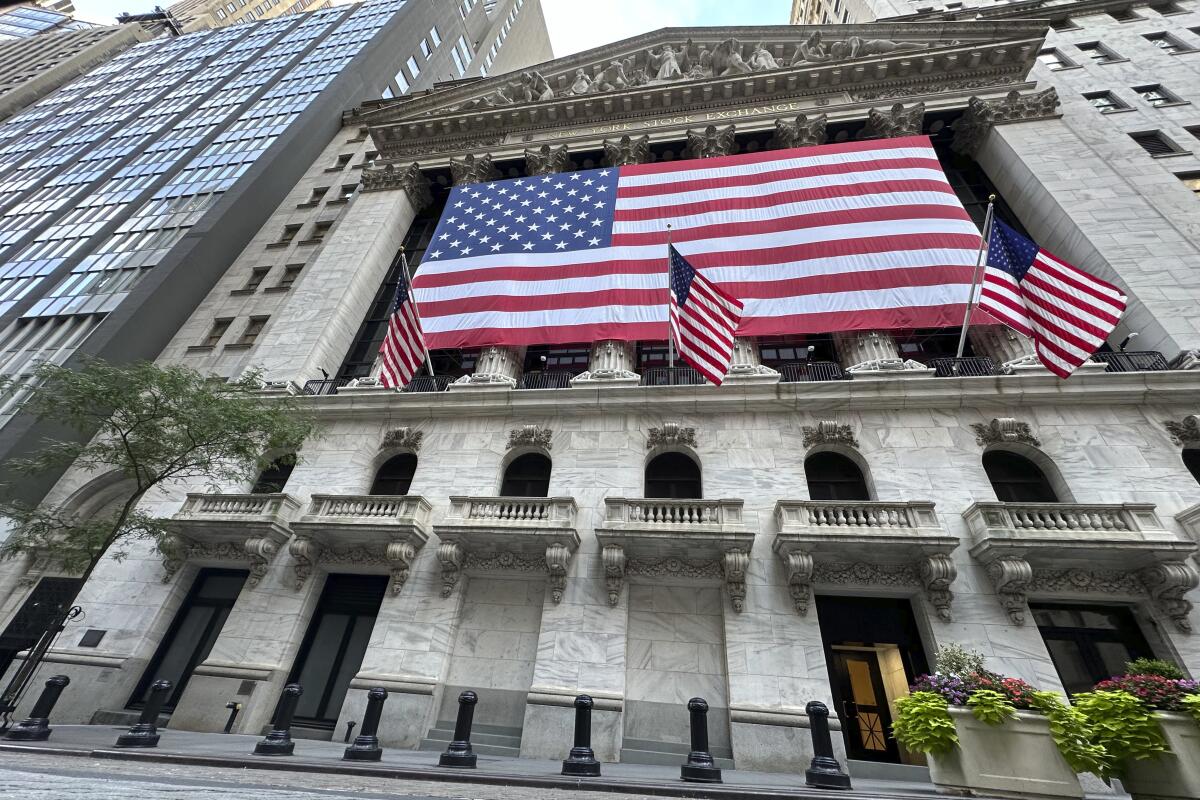Wall Street’s scorching rally sets more records as hopes rise for rate cuts

- Share via
NEW YORK — U.S. stocks rose to more records Friday after a highly anticipated report on the job market bolstered Wall Street’s hopes that interest rates may soon get easier.
The Standard & Poor’s 500 climbed 0.5% to set an all-time high for a third straight day after Thursday’s pause in trading for the Fourth of July holiday. The index has already set 34 records and climbed close to 17% this year, which is only a little more than halfway done.
The Dow Jones industrial average rose 0.2%, while the Nasdaq composite added 0.9% to its own record.
The action was more decisive in the bond market, where Treasury yields sank after the U.S. jobs report. Employers hired more workers last month than economists expected, but the number was still a slowdown from May’s hiring. Plus, the unemployment rate unexpectedly ticked higher, growth for workers’ wages slowed and the U.S. government said hiring in earlier months was lower than previously indicated.
Altogether, the data reinforced belief on Wall Street that the U.S. economy’s growth is slowing under the weight of high interest rates. That’s precisely what investors want to see because a slowdown would keep a lid on inflation and could push the Federal Reserve to begin cutting its main interest rate from the highest level in two decades.
The question is whether the economy can remain in this Goldilocks state of not too hot and not too cold, while the Federal Reserve times its next moves precisely. The hope is that the Fed will lower interest rates early and significantly enough to keep the economic slowdown from sliding into a recession, but not so much that it allows inflation to regain strength and take off again.
The clearest takeaway from the jobs report for financial markets was that it keeps the Fed on track to cut its main interest rate later this year, probably in September and perhaps again in December. The two-year Treasury yield, which closely tracks expectations for Fed action, fell to 4.60% from 4.71% late Wednesday.
The yield on the 10-year Treasury, which is the centerpiece of the bond market, fell to 4.27% from 4.36% late Wednesday and from 4.70% in April. That’s a notable move for the bond market and offers support for stock prices.
Friday’s jobs report follows a mass of data showing a slowdown across the U.S. economy. Reports this week said business activity in both the U.S. services and manufacturing sectors contracted last month, turning in weaker readings than economists expected. And U.S. shoppers at the lower end of the income spectrum have been showing how difficult it is to keep up with still-rising prices, as balances owed on credit cards swell.
“What matters for long-term investors is whether fears of a recession become a reality,” said Brian Jacobsen, chief economist at Annex Wealth Management. “We think it’s unlikely we’ll see a recession this year or next, but that doesn’t mean the markets won’t fear one.”
On Wall Street, gold miner Newmont rose 2.4% for one of the larger gains in the S&P 500. It benefited from a rise in the price of gold, which usually strengthens when interest rates fall. It’s the flip side of when rates are rising and bonds are paying higher yields, which can pull investors away from gold because it pays its holders nothing.
Gains for some big, influential stocks also helped support the market, even though the majority of stocks within the S&P 500 fell. Meta Platforms jumped 5.9%, and Apple added 2.2%.
Amazon rose 1.2% after the announcement of a deal in which the parent company of Saks Fifth Avenue will buy Neiman Marcus Group for $2.65 billion. Amazon will hold a minority stake in the combined company.
On the losing end of Wall Street were companies tied closely to cryptocurrency activity, as bitcoin briefly tumbled below $54,000 from nearly $63,000 early this week before recovering a bit. The cryptocurrency’s value fell roughly back to where it was in February.
Coinbase Global slipped 0.6%, and Robinhood Markets fell 0.9%.
All told, the S&P 500 rose 30.17 points to 5,567.19. The Dow added 67.87 points to close at 39,375.87, and the Nasdaq gained 164.46 points to 18,352.76.
In stock markets abroad, London’s FTSE 100 fell 0.5% after British voters ushered in a new regime by throwing out Conservatives in this week’s national election.
The United Kingdom experienced a run of turbulent years during Conservative rule that left many voters pessimistic about their country’s future. The U.K.’s exit from the European Union followed by the COVID-19 pandemic and Russia’s invasion of Ukraine battered the economy. Rising poverty and cuts to state services have led to gripes about “Broken Britain.”
In Asia, Japan’s Nikkei 225 topped the 41,000 level early Friday to rise above its record closing level set on Thursday, but it ended the day marginally lower.
Choe writes for the Associated Press.
More to Read
Inside the business of entertainment
The Wide Shot brings you news, analysis and insights on everything from streaming wars to production — and what it all means for the future.
You may occasionally receive promotional content from the Los Angeles Times.










